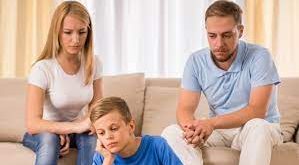Children have so much to learn about the world and this is the main reason why they are so curious. As a parent, you may not find it difficult to answer most of your child’s everyday queries. However, there may be a problem when kids ask awkward questions such as thosepertaining to sex, reproductive organs, etc. Answering these questions can be a challenge since children may be too young to understand everything and yet they may need to be provided with meaningful information. As a parent, you cannot tell them everything, but still you need to give them a basic idea of how things work. When kids ask you such questions, you should not ignore them since it will prompt them to seek answers elsewhere. In that case, they may be given wrong information or may also face abuse. It’s always better that parents should answer the questions of their kids, even when the questions may seem a bit awkward. Here are some good answers for some of the most common questions asked by kids.
Where does the baby come from?
If you are expecting another child, your first child may ask you about how and where the baby comes from. To answer this, you can just say that the baby is created out of love and remains inside mommy’s stomach till she is ready to enter this world. There is no need to explain the details since the child may not understand it.
What is sex?
If your child asks this question, it is clear that they must have read about it somewhere or they may have heard someone talking about it. To answer this, just say that sex is a special form of love that a mother and father share with each other.
Why are my private parts different?
A boy or a girl may ask this question. They may have noticed the difference when they may have been with other children. Kids are often curious about their body parts and it’s natural for them to explore such things. To answer this question, you can say that just like different animals have differently shaped bodies, boys and girls also have different body parts.
What is sanitary napkin?
Your child may have seen an advertisement on the television andmay have asked this question. To answer this, tell them it’s meant for women and for girls who have reached a certain age. Tell them that just like a paper napkin is used to keep the hands clean, a sanitary napkin is used to keep the private parts clean.
What is condom?
Tell them that just like a glove is used to protect the hand from cold or injury, a condom is used by adults to protect themselves from diseases. Your child may not yet fully comprehend the contraception angle, so just keep the focus on the disease prevention aspect.
What are periods?
It’s the responsibility of the parents to explain that periods are a normal occurrence for every girl and it starts after a certain age. You also need to talk about hygiene and cleanliness and other details, as relevant to the cycle of menstruation. As a mother, you need to tell them that you too had experienced this and it is not something to worry or ashamed about.
What is nightfall?
Just tell your child that it is nature’s way to release accumulated liquid from the body. Give them the example of how they pee and they will get the basic idea. Tell them that it is natural and there is nothing to worry or ashamed about.
What is masturbation?
Tell your child that it is a way to release build-up liquid from the body. Tell them that there’s a small pouch in their body and when it gets filled with liquid, it can be released through masturbation. Tell them it’s normal, but it’s healthy to do it in moderation.
Similarly, you can answer other questions also. And feel good that the child is asking you, since it implies that the child trusts you and considers you a friend. It will also protect your child from potential abuse, being misdirected with wrong information or developing negative feelings of inferiority complex.
 Newspatrolling.com News cum Content Syndication Portal Online
Newspatrolling.com News cum Content Syndication Portal Online






